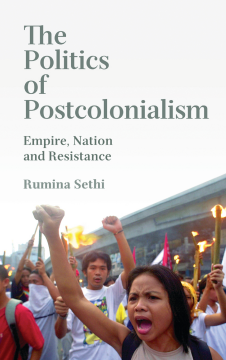
Additional Information
Book Details
Abstract
In a period of vast global restructuring, unrestricted capital has eroded the traditional distinctions between nations and nationhood. In The Politics of Postcolonialism, Rumina Sethi devises a new form of postcolonial studies that makes sense of these dramatic changes.
Returning to the origins of the discipline, Sethi identifies it as a tool for political protest and activism among people of the third world. Using a sophisticated mix of spatial theory and local politics, she examines the uneven terrain of contemporary anti-capitalism and political upsurges in Africa, Asia and Latin America, emphasising postcolonial politics, dissent and resistance. Her analysis shows that as the traditional means of direct political control have largely lost their hold, postcolonial cultures, now dominated by neoliberalism, are seeking fresh ways to express their discontent.
This original and persuasive work frees the discipline from its current preoccupation with hybridity and multiculturalism, giving students of politics, cultural studies and international relations a new perspective on postcolonialism.
'Challenges postcolonial critics to put their feet back on the ground and to link the postcolonial once again to the political activism by which it has always been inspired'
Robert J.C. Young, Julius Silver Professor of English & Comparative Literature at New York University
An excellent book... the author provides a concise and coherent account of postcolonialism and its relevance to contemporary debates without falling into the all too common trap of overly complicated accounts that fail to provide direction and nuances.
Dr Gurchathen Sanghera, Lecturer in International Relations, University of St Andrews
'This book develops an argument that is both even-handed and radical. Rumina Sethi explores the history and the difficulties of post-colonial theory and without jettisoning its value she urges quite fresh thinking about its political and social implications'
Dame Gillian Beer, King Edward VII Professor Emeritus at the University of Cambridge
'Her critical analysis of the 'politics of postcolonialism' and the lack of constructive dialogue with the Marxist perspective, interweaving with analysis of globalisation and the state of 'postcoloniality,' seeks to overcome the academic ossification of concepts that should be integrated with social change and activism'
Noam Chomsky
Table of Contents
| Section Title | Page | Action | Price |
|---|---|---|---|
| Cover | Cover | ||
| Contents | vii | ||
| Acknowledgements | viii | ||
| 1. Postcolonialism and its Discontents: An Introduction | 1 | ||
| 2. The End of the Nation? | 30 | ||
| 3. Globalization and Protest | 59 | ||
| 4. The United States and Postcolonialism | 87 | ||
| 5. Conclusion: New Directions | 111 | ||
| Notes | 125 | ||
| Bibliography | 154 | ||
| Index | 169 |
